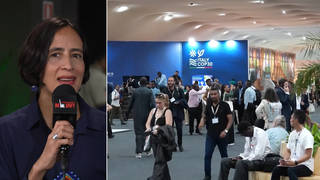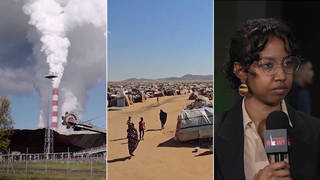
Topics
Guests
- Jessica BarryCommunications coordinator and spokesperson for the International Committee of the Red Cross in Kabul.
Dozens of Afghan civilians have been killed in what may be one of the deadliest US bombings of Afghanistan to date. We go to Kabul to speak with Jessica Barry of the International Committee of the Red Cross in Kabul. [includes rush transcript]
Transcript
AMY GOODMAN: Dozens of civilians were killed Tuesday in a US bombing in Afghanistan in what may be one of the highest civilian death tolls of the war. Witnesses say US warplanes bombed scores of homes during clashes with Taliban fighters in the western Afghan province of Farah. The Pentagon says it’s investigating.
Estimates of the dead range from fifty to as many as 150. A Red Cross team reached the scene of the air strikes yesterday afternoon. They say dozens of civilians were killed, including many women and children.
Jessica Barry is the communications coordinator and spokesperson for the International Committee of the Red Cross. She is in Kabul. She joins us on the telephone from there.
Welcome to Democracy Now!, Jessica. Can you tell us what you understand has happened?
JESSICA BARRY: Yes. When our team from the ICRC went in on Tuesday afternoon, they came to two villages which have clusters of houses around them. They did indeed see dozens of bodies, they saw graves, and they saw burials going on.
We had been contacted by the tribal elders of the villages the night before, when the fighting took place. And they told us that there were civilian casualties, and they asked for our help. What we did, as we always do when there are clashes and incidents like this, we contacted all the different sides — the armed occupation, the international military forces, the Afghan forces. We said to them that civilians were there, that they should not be harmed, they must be protected, and we asked for the security guarantees to let our team go in independently, which is what we did.
AMY GOODMAN: Where exactly did this take place?
JESSICA BARRY: It’s in the western part of Afghanistan in a district called Bala Baluk. And these are small villages, rural villages. In those villages, there are Afghan Red Crescent, which is a part of the Red Cross, Red Crescent Movement. They have community volunteers to do first aid. This is in all — many cities across or many villages across Afghanistan. There were community first aid volunteers in those villages. They were helping with the injured. And very tragically, one of them, with his family of thirteen members, who was taking shelter in a house, joined the fighting, died with his whole family when the house was hit.
AMY GOODMAN: And exactly when do you understand this happened and the circumstances under which it happened?
JESSICA BARRY: Well, it was on Monday evening that the tribal elders first contacted our teams in Farah and in Herat. This was already ongoing, and they said that they’re fighting and the raids, the air raids, were going on. We were then in contact, as I say, with all the different sides from that time on, so throughout Monday evening. And then, we were able to get in on Tuesday afternoon. By that time, the injured — we didn’t see injured people. The injured people had already been taken out. But as I say, when we got there, people were burying the dead.
AMY GOODMAN: And any firsthand accounts that you got from Red Cross who were there speaking to people on the ground, the survivors?
JESSICA BARRY: As I say, it was the — the worst part for us was the volunteer from the community-based first aid, from the Afghan Red Crescent, who was killed.
But it’s so much more important than the individuals in this situation. Whenever there is fighting, civilians are always the ones that get caught up in it. And it is really a message which the ICRC passes to all of the sides, whether it be Taliban suicide bombers who blow themselves up in markets, whether it be air strikes, whether it be night raids, whether it be fighting. Where there are civilians and where this happens in populated areas, it’s absolutely essential that the civilians are spared and kept safe as much as possible.
This, very sadly, is not the first incident that there has been civilian casualties. As you well know, over the past year, civilian casualties have gone up in Afghanistan. The fighting is intensifying. It’s spreading. And it’s a huge priority to make sure that civilians are safe, that they are kept free from harm, and that situations like this do not happen.
AMY GOODMAN: Well, I want to thank you very much for being with us. Jessica Barry is communications coordinator and spokesperson for the International Committee of the Red Cross. She was speaking to us in Kabul. The killings took place in the Farah province in western Afghanistan.












Media Options